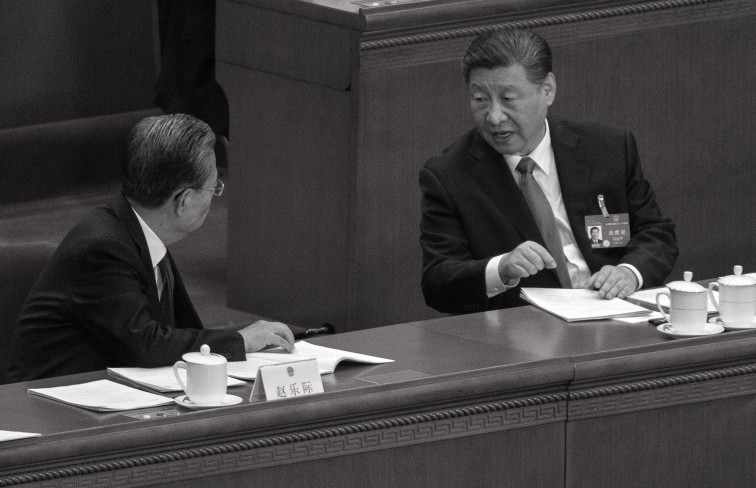On September 19, 2025, during a phone call between Trump and Xi, Trump came away with a double win, while the CCP’s wolf warrior diplomacy was left deflated. (Image by People News)
[People News] The recently concluded Trump–Xi summit in South Korea drew attention for one unusual reason: the Taiwan issue was not mentioned at all. In a segment aired by CBS News on November 2, U.S. President Donald Trump stated that Chinese Communist Party leader Xi Jinping understands the consequences he would face if he invaded Taiwan. However, Taiwanese scholars warned that the omission of Taiwan at the summit does not mean there is room for complacency.
According to AFP, during an interview at Mar-a-Lago in Florida on October 31, Trump said that when he met Xi Jinping face-to-face on October 30 in South Korea—their first such meeting in six years—“we didn’t even bring up the Taiwan issue.”
When the 60 Minutes host asked whether Trump would order U.S. military intervention if Beijing took military action against Taiwan, Trump replied:
“If that ever happens, you’ll see the result—and he (Xi) knows what the answer is.”
Trump continued:
“He didn’t bring up the topic during yesterday’s meeting (the Trump–Xi summit). Everyone was a bit surprised he didn’t, because he knows—very clearly—what our response would be.”
Pressed further—if Xi knows the consequences of attacking Taiwan, why not state them publicly?—Trump answered:
“I can’t show my cards. I can’t reveal the secret. I’m not the kind of person who tells everything just because someone asks. But they know what would happen.”
Trump reiterated:
“He (Xi) has said publicly—and his team also made clear in the meeting—‘We won’t take any action during President Trump’s term,’ because they know what the consequences would be.”
Liu Pengyu, spokesperson for the Chinese embassy in Washington, did not directly respond to whether Xi promised not to attack Taiwan. He simply stated:
“The Taiwan question is China’s internal affair. How to resolve it is for the Chinese people alone to decide.”
The Associated Press noted that U.S.–Taiwan relations are based on the Taiwan Relations Act of 1979. The act does not explicitly require the U.S. to send troops if Beijing attacks but obliges Washington to help Taiwan maintain sufficient self-defense capabilities to prevent any unilateral change to the status quo.
In July, CNN released an audio clip from a Trump campaign fundraising event. In it, Trump not only boasted about threatening Russian President Vladimir Putin but also revealed that he privately warned Xi Jinping that if he dared to attack Taiwan, Trump would “bomb Beijing.”
Trump said:“He (Xi) thought I was crazy.”
According to Trump, Xi responded, “Beijing? You’d bomb it?”
Trump replied, “I have no choice—I’d have to bomb you.”
Trump added, “He didn’t believe me, but even if he believed 10%, or 5%, that’s enough.”
The Summit’s Silence on Taiwan: Scholars Warn Against Complacency
Although the Taiwan issue has long strained U.S.–China relations, both Trump and Xi seemed to avoid the sensitive topic at this summit, focusing instead on easing the trade war between Washington and Beijing.
Li Dazhong, Director of the Graduate Institute of International Affairs and Strategic Studies at Tamkang University, told United Daily News that the summit’s omission of Taiwan does not mean Taiwan can “sleep soundly.” Trump has already announced plans to visit China in April next year, and based on past experience, Xi is unlikely to avoid mentioning Taiwan entirely in an official U.S.–China meeting. “The U.S.–China relationship has its own issues, and so does the Taiwan–U.S. relationship,” Li said, urging close attention to future U.S.–China–Taiwan dynamics.
Chen Shih-min, Professor of Political Science at National Taiwan University, likewise cautioned that although this was a short meeting in a third country (South Korea), when Trump visits China, the Taiwan issue will likely come up—and “we’ll have to see what both sides say then.”
Wang Hung-jen, Professor of Political Science at National Cheng Kung University, noted that before the summit, Trump had said Taiwan might be discussed. Its absence from the agenda showed that both sides preferred not to let Taiwan dominate the meeting, focusing solely on trade. “That’s actually a good thing,” Wang said. He added that Xi’s opening remarks—stating that “China and the United States can together demonstrate great-power responsibility”—were intended to suggest joint management of Indo-Pacific affairs, including Taiwan. “But since the meeting ended with talk only of fentanyl and trade imbalances, and no mention of Taiwan, it’s clear there is no so-called ‘G2 co-management’ mechanism.”
According to NOWnews, Ma Chun-wei, Assistant Professor of Political Science at Tamkang University, agreed that economic issues are currently the top priority for both Washington and Beijing:
“This shows the U.S. does not believe a Taiwan Strait conflict is imminent, and thus sees no need to rush the issue onto the negotiation table. For Taiwan, that may not be a bad thing.”
Chen Dongxiao, President of the Shanghai Institutes for International Studies, also commented that given current circumstances, “Beijing is not particularly worried about the Taiwan issue at this time.”
△











News magazine bootstrap themes!
I like this themes, fast loading and look profesional
Thank you Carlos!
You're welcome!
Please support me with give positive rating!
Yes Sure!